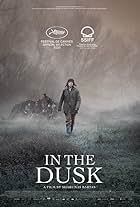In Kaliningrad two Lithuanian boys meet two Russian girls. They have difficulties in finding places where they can sleep together. But this is the only problem they do solve. All four justly... Read allIn Kaliningrad two Lithuanian boys meet two Russian girls. They have difficulties in finding places where they can sleep together. But this is the only problem they do solve. All four justly feel miserable because their lives are meaningless (the recurrent dull and poorly kept ho... Read allIn Kaliningrad two Lithuanian boys meet two Russian girls. They have difficulties in finding places where they can sleep together. But this is the only problem they do solve. All four justly feel miserable because their lives are meaningless (the recurrent dull and poorly kept house façads could well be taken as a comparative symbol). In addition, everyone is so absor... Read all
- Awards
- 3 wins & 2 nominations
- Director
- Writer
- All cast & crew
- Production, box office & more at IMDbPro
Storyline
Did you know
- ConnectionsEdited into Histoire(s) du cinéma: Le contrôle de l'univers (1999)
- SoundtracksLambada
Performed by 'Kaoma'
In this realm of experience Sharunas Bartas renders in Three Days, there is a beauty of surfaces and distances, an endless sense of moment, the space characters occupy before moving on, the way light immerses everything in its shifting and waning powers, manifesting a landscape apparently out of nothingness, a nothingness which seems to persist when place and beings are subsumed into the atmospheric field, endlessly holding our gaze. A deepening dimension of silence reveals a startling lucidity of forms and sounds, especially effective as seen and heard through distance. All of which tentatively define time as it arises, and a place which keeps taking place. Although our gaze continually moves between figure and background, our attention is occasionally suspended in moments of emotive mystery: Why is she suddenly laughing? Or crying? Thus Katerina Golubeva haunts us as well.
The conventional modes of narrative, dialogue and exposition used by popular forms of cinema have created a systemic refuge of meaning for us, heavily conditioning our belief that what passes as storytelling is actually a direct way into knowing who we are, rather than a continued shared desire to conform our behaviors predictably into acceptable cultures. Thus storytelling has become a highly cultivated way of transmitting un-truths. Bartas radically exposes this mythology of culture in creating his profoundly mysterious cinema, not because he withholds information from us, but simply because he suggests an impossibility of truly knowing others on deeper levels (an insight also registered in some films by Claire Denis and Chantal Akerman). Apparently unavailable are these private lives before us, their pain barely surfacing to negotiate an entropic numbness.
However, an ability (in fact the very invitation to the viewer) to bear witness, is quite important here. In the feeling of being present there, in a room with the woman and man, there is no sense of voyeurism merely because we are given access to their private moments: as they lay on the bed, fully clothed, without speaking, she holding him against herself, gently stroking his hair, his face hidden in her coat, the dance-hall music from across the way distant but audible, her tears visible as she begins to cry silently. What registers is highly unusual: instead of empathy because you might understand why she's crying (you actually might not), the moment involves being present to witness her distress, without even knowing why, and only because you have been given special permission to do so, which has become clear. Through this act of grace, Bartas allows us to bear witness to these lives without the need to "own" the experience through having one's subjectivity excercised; it enables a witnessing so eminently humanizing. In fact, it seems an ethical subversion of the usual effects of emotional pornography characteristic of so much common cinematic manipulation, wherein a typical excess of information "gets us going."
There are moments when these human figures we encounter almost emerge as full-fledged subjects, before disappearing again into their maintained silence. Mostly speechless, they drift along or meet up, drift together for a while, through rooms, into encounters without welcome or conclusion. The drifting itself evokes a wayward miasma: there seems to be nothing to do but gradually move, entering buildings through windows, turning around when gates are closed, living outside possibilities of comfort, standing here and there, standing some more before moving on again.
Yet the realm they inhabit and pass through - this supreme transience of presence, seemingly containing everything, full of subtle contingencies - becomes an aesthetic one unsurpassed by alienation, and one which has steadily encompassed our feeling, not just our witness. And so what is made available finally, one of the film's true gifts, is a newly possible vision, making one suspect: Is this after all nothing less than the life - of the whole world - which we are witnessing?
- TravelerThruKalpas
- Dec 3, 2009
- Permalink
Details
Contribute to this page


























